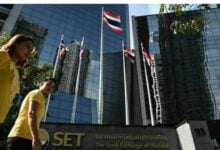SET anticipates foreign investor return amid economic policy progress

The Stock Exchange of Thailand (SET) anticipates a resurgence of foreign investors as progress in the nation’s economic policies, baht stability, and economic recovery gains momentum.
Over the past eight months, foreign investors have sold more than they purchased, resulting in a net outflow of 22.4 billion baht (US$ 606,388,832). Despite this, the foreign investor trading ratio remained the highest among investor types for 17 consecutive months, according to Soraphol Tulayasathien, senior executive vice-president of the SET.
The SET index, which ended September at 1,471.43 points, contracted by 11.8% year-to-date, echoing the performance of other regional markets. The average trading value of the SET and the Market for Alternative Investment plunged 34.1% year-on-year to 49.5 billion baht (US$1,340,011,035). For the first nine months of 2023, the combined daily trading value of both markets averaged 56.2 billion baht.
Soraphol attributes this decline to US bond yield increases. In September, the Federal Open Market Committee decided against revising the policy rate, effectively ruling out a US recession within the year. This coupled with an extended tightening cycle by the US central bank contributed to the US dollar’s rally, prompting fund outflows from several Asian stock markets, reported Bangkok Post.
Soraphol revealed the fund repatriation to US bonds, a stronger dollar, and China’s unstable economy led to the outflow, which significantly weakened other currencies, including the baht.”
Despite these challenges, Soraphol remains optimistic about Thailand’s economy. He cited domestic consumption, tourism, and an export rebound as the key drivers of this positive outlook.
“Foreign investors are waiting for the right time to return to the Thai market, pending progress on the government’s economic policies, a clear direction for the baht, and Thailand’s economic recovery.”
At the end of last month, the Thai stock exchange’s forward price-to-earnings (P/E) ratio was 16.5 times, surpassing the average of Asian stock markets at 12.8 times.
Its historical P/E ratio is 22.5 times, again higher than the Asian average of 14.7 times. However, the dividend yield for the Thai bourse, at 3.15%, lags behind the Asian stock markets’ average of 3.39%.
Follow more of The Thaiger’s latest stories on our new Facebook page HERE.
Latest Thailand News
Follow The Thaiger on Google News:


























